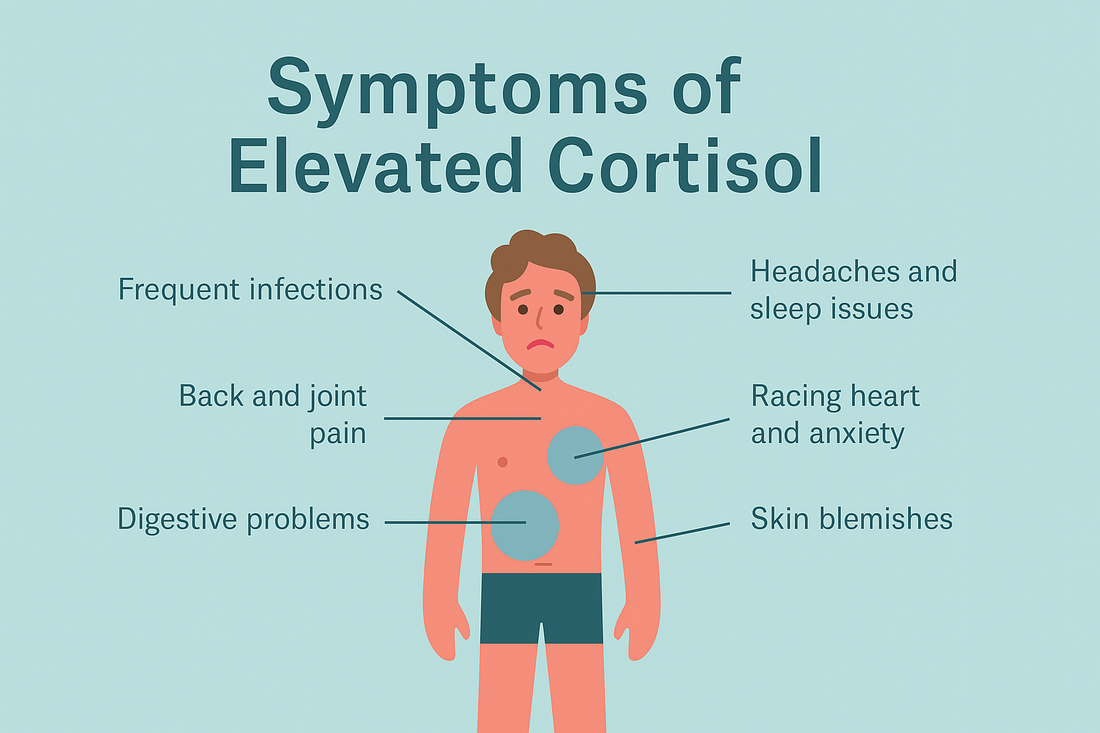
Cortisol: The Hidden Hormone Sabotaging His Health
By Bryce WyldeYou see it. He’s wired but exhausted. Pushing through, but not really present. Falling asleep on the couch or wide awake at 2 a.m. You may have blamed it on stress, aging, or overwork—but there’s likely something deeper going on.
It could be cortisol, his body’s primary stress hormone. At HUSBAND, we test it because cortisol doesn’t just affect mood. It drives how he stores fat, uses energy, recovers from workouts, and even produces testosterone.
If his cortisol is off, everything else feels off too.
What Is Cortisol?
Cortisol is a hormone made by the adrenal glands that helps regulate energy, blood pressure, inflammation, metabolism, and stress response. It’s meant to spike in the morning (to help him wake up) and taper at night (so he can wind down).
But when cortisol stays chronically high—or crashes from burnout—it wreaks havoc.
| This isn’t just a stress problem. It’s a metabolic, hormonal, and aging problem. |
Why It Matters for Men 40+
After 40, cortisol patterns often become dysregulated. High-demand jobs, poor sleep, sugar intake, and overtraining can all keep his cortisol elevated far beyond what’s healthy.
Imbalanced cortisol can lead to:
-
Constant fatigue and low motivation
-
Belly fat (especially around the waist)
-
Poor sleep and nighttime waking
-
Low testosterone and reduced libido
-
Brain fog, irritability, and burnout
And if cortisol is too low from chronic stress, he may feel unmotivated, weak, and emotionally flat.
What the Research Says
-
Chronically elevated cortisol increases visceral fat, insulin resistance, and cardiovascular risk—even in otherwise fit men.
-
Cortisol and testosterone are inversely related: the more stress, the less hormonal strength.
-
Flattened cortisol rhythms are linked to poor sleep quality, accelerated brain aging, and depression in men.
-
Functional medicine views cortisol as a foundational biomarker for identifying adaptive stress load before full burnout occurs.
In short: Cortisol doesn’t lie. It tells us how his body is actually handling the pressure.
Why HUSBAND Tests It
At HUSBAND, we include morning cortisol testing in our core lab panel with SiPhox—not just because it’s relevant, but because it’s foundational. This hormone gives us insight into his stress capacity, energy curve, sleep quality, and metabolic load.
We don’t rely on guesswork. We measure it, then we manage it.
What to Expect
When cortisol comes back into rhythm, most men notice:
-
More energy in the morning, less crashing mid-day
-
Better sleep depth and duration
-
Reduced belly fat
-
Fewer emotional outbursts or “short fuses”
-
Sharper thinking and more motivation
If his cortisol is too high or low, our next steps may include:
-
Adaptogens like Ashwagandha and Rhodiola
-
SunTheanine® L-Theanine to promote alpha brain waves
-
Magnesium glycinate for nervous system balance
-
Cold exposure, strategic exercise, and light therapy
-
Precision sleep protocols with California Poppy + Melatonin
| This isn’t just about calming down. It’s about showing up strong, stable, and clear. |
What Experts Say
Dr. Shawn Talbott, PhD and author of The Cortisol Connection calls cortisol “public enemy number one” when it comes to energy, mood, and metabolism. He emphasizes that chronically elevated cortisol is one of the most destructive forces in men’s health, linking it directly to low testosterone, poor sleep, increased abdominal fat, and emotional volatility. “If you don’t get cortisol under control,” Talbott says, “nothing else you do—diet, supplements, exercise - will work the way it should.” Testing it, managing it, and restoring balance is key to real, lasting vitality.

